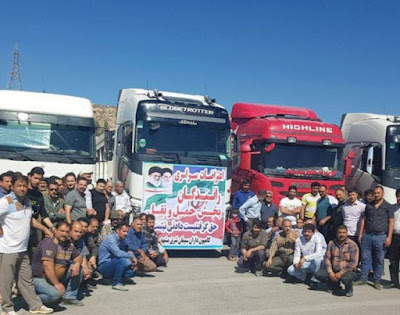Especially worrying to the Islamic Republic’s establishment is the fact that many oil truck drivers have joined the strike, disrupting fuel distribution across the country and leading to long lines at the pump in many cities.
Iran’s striking truck drivers have been threatened with execution by some of the country’s top prosecutors.
The strike, which entered its second week September 30, is in response to what truck drivers say are terrible working conditions. They demand better pay, government subsidies to buy tires and other expensive parts that have to be imported, improvements to the country’s roadways, pensions, and strengthened trade unions.
The crash of Iran’s currency has made imported goods and spare parts very expensive, while the pay or cargo fees have barely moved.
Dozens of striking truck drivers have been detained across the country.
There are three types of truckers in Iran; those who fully own their trucks and others who still have to pay for their trucks to government-controlled companies in instalments for years. Still others, a minority, work for truck owners.
Most of the time, truck drivers find themselves working for the government, the biggest importer and distributor of strategic commodities, particularly fuel and foodstuff, based on a daily wage, or fee per kilometer.
According to the state-run Mehr News Agency (MNA), the city of Zarand’s Prosecutor-General Mehdi Qawidel described the detainees as “opportunists and profiteers” whose strike was a “provocation by hostile foreign governments.” Qawidel went further by threatening the drivers, insisting that they should be treated as criminals who deserve to be hanged.
The Islamic Republic’s Prosecutor-General, mid-ranking cleric Mohammad Ja’far Montazeri, also threatened the striking truckers with death on September 27, saying anyone who disrupts the transportation of goods will be considered a criminal and could face the death penalty.
Echoeing Montazeri’s threats, the Public and Revolutionary Prosecutor of the city of Shiraz, Ali Salehi, cautioned that the truckers will be “seriously dealt with,” adding, “Anyone who obstructs the supply of goods and services in any way will be seriously dealt with according to the law.” He said the strikers could face charges ranging from disturbing public order and security to deliberate damage to property. He added that these “crimes” may even be considered Moharebeh (fighting God).”
Another mid-ranking cleric and the judiciary’s spokesman, Gholam Hossein Mohseni Ejei, also joined the chorus September 30, warning, “Those provoked by the enemy to disrupt the transport system should be reminded that a heavy punishment is waiting for the rabble-rousers.”
The state-run Iran Students News Agency (ISNA) cited Mohseni Ejei as saying, “All the prosecutors across the country have been called up to detain disruptors with the help of security forces without hesitation.”
An earlier round of strikes over the summer saw at least 70 truck drivers arrested in Fars and Qazvin provinces, as well as in the city of Pakdasht southeast of the capital, Tehran. The truckers got back on the road, however, after the government agreed to meet their demands. Representatives of the drivers say they have renewed their strike after growing impatient with the government to make good on its promises.
A judiciary official in Kerman Province reported September 30 that another seven strikers have been taken into custody in that province alone in this recent round of strikes.
Local news outlets, including Khane-ye Mellat (the House of the Nation), Iranian parliament’s official website, have published a letter signed by 175 MPs in calling on President Hassan Rouhani’s administration to meet the truckers’ demands.
Especially worrying to the Islamic Republic’s establishment is the fact that many oil truck drivers have joined the strike, disrupting fuel distribution across the country and leading to long lines at the pump in many cities.
Source: radiofarda.com, October 1, 2018
⚑ | Report an error, an omission, a typo; suggest a story or a new angle to an existing story; submit a piece, a comment; recommend a resource; contact the webmaster, contact us:
deathpenaltynews@gmail.com.
Opposed to Capital Punishment? Help us keep this blog up and running! DONATE!
"One is absolutely sickened, not by the crimes that the wicked have committed,
but by the punishments that the good have inflicted." -- Oscar Wilde












